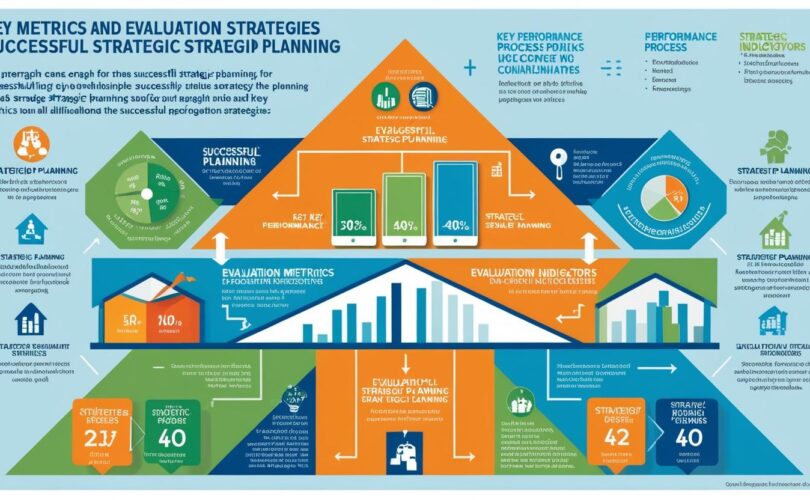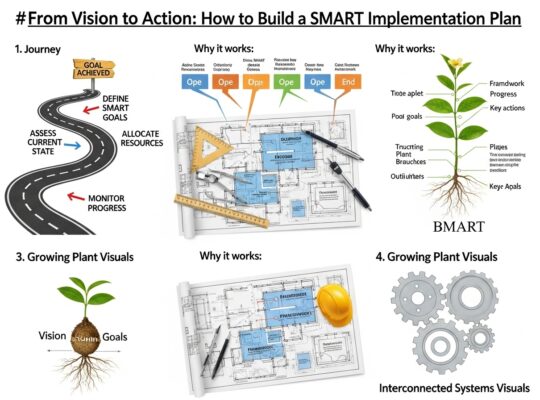Introduction
Measuring the success of a strategic plan is paramount for any organization aiming to achieve its goals and objectives. It involves a systematic approach to evaluating performance, identifying areas of improvement, and making data-driven decisions. Here’s a comprehensive guide on how to measure the success of your strategic plan using the right metrics and evaluation strategies.
Defining Key Performance Indicators (KPIs)
KPIs are the cornerstone of measuring strategic plan success. They should be specific, measurable, and aligned with your strategic objectives. These metrics can be financial, such as revenue growth, profit margin, or return on investment (ROI), or non-financial, such as customer satisfaction, employee engagement, or market share.
Setting Targets for KPIs
Establishing realistic and achievable targets for each KPI is crucial. These targets should be based on historical data and industry benchmarks. This helps in measuring progress and assessing whether the organization is on track to achieve its goals. As Peter Drucker once said, “What gets measured gets managed,” emphasizing the importance of setting clear targets.
Collecting and Analyzing Data
Regular data collection from both internal and external sources is essential. Internal data can come from financial reports, customer surveys, or employee feedback, while external data can be derived from industry reports or competitor analysis. Analyzing this data helps identify trends, patterns, and areas of improvement. This analysis should be timely, quantifiable, and repeatable to ensure continuous monitoring and adjustment of the strategic plan.
Communicating Results
Effective communication of KPI results to stakeholders, including employees, investors, and customers, is vital. This communication should highlight successes and areas needing improvement. Using performance dashboards and visual tools like graphs and charts can simplify the data and make it more understandable for all stakeholders. As Jack Welch, former CEO of GE, noted, “An organization’s ability to learn, and translate that learning into action rapidly, is the ultimate competitive advantage,” which underscores the importance of clear and timely communication.
Continuous Improvement
The final step in measuring the success of your strategic plan is continuous improvement. Use the data and analysis to optimize performance, adjust targets, or shift resources to achieve better outcomes. This involves revisiting goals and objectives regularly, reviewing measures to ensure they align with the strategy, and supervising monitoring systems to streamline the evaluation process.
Qualities of Good Strategic Metrics
Good strategic metrics must be actionable, timely, quantifiable, repeatable, and understandable. They should provide objective and statistical insights rather than subjective or gut-based decisions. Ensuring these qualities helps in developing performance metrics that are effective in evaluating the success of the strategic plan.
Using Balanced Scorecards and Strategy Maps
Tools like balanced scorecards and strategy maps are invaluable in translating your strategy into measurable goals and objectives. A balanced scorecard provides a holistic view of business performance, ensuring all employees are aligned with the strategy. Strategy maps outline the cause-and-effect relationships underpinning your strategy, helping to identify critical performance variables.
Conclusion
Measuring the success of your strategic plan is an ongoing process that requires careful planning, execution, and evaluation. By defining and tracking the right KPIs, setting realistic targets, collecting and analyzing data, communicating results effectively, and continuously improving, you can ensure your strategic plan is successful and your organization is on track to achieve its objectives.
For expert guidance on crafting and measuring the success of your strategic plan, consider consulting with Samunnati Ventures. With over 20 years of experience in feasibility studies, business plans, financial modelling, and corporate strategy across various industries and global markets, Samunnati Ventures can help you create a vision and strategy tailored to your organization’s needs, ensuring you move forward with purpose and achieve your goals. Contact us today to learn more.






